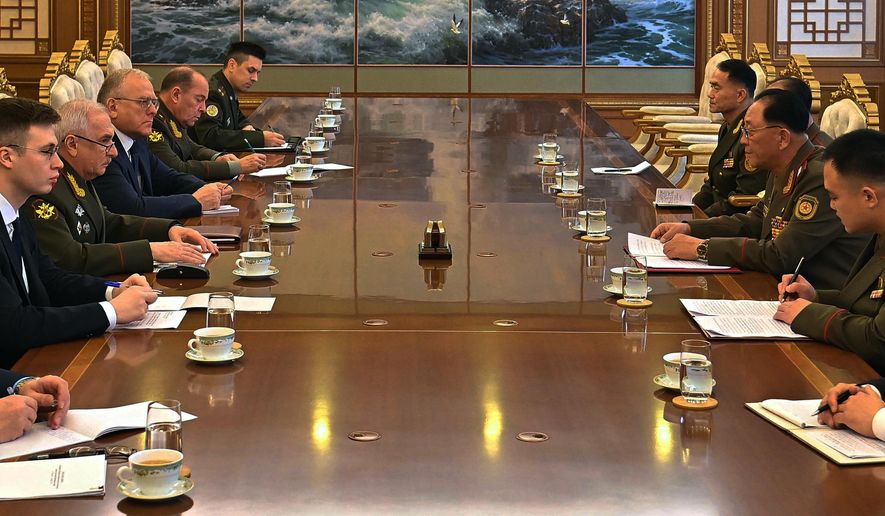A version of this story appeared in the daily Threat Status newsletter from The Washington Times. Click here to receive Threat Status delivered directly to your inbox each weekday.
SEOUL, South Korea — North Korea is strengthening its ties with Moscow and ignoring outreach from President Trump; on Friday it test-fired a short-range ballistic missile off its east coast, according to the South Korean military.
But as senior Russian military officers visit Pyongyang this week and fresh North Korean units move into Russia to help in Moscow’s war against Ukraine, questions are rising over North Korean leader Kim Jong-un’s aims.
Experts say Mr. Kim is seeking to maintain his relevance to Russian President Vladimir Putin without risking any more of his best troops in battle — and may even be suffering pangs of conscience.
A military delegation led by Russian Deputy Defense Minister Viktor Goremykin has been meeting senior North Korean officials this week, including North Korean Defense Minister No Kwang-chol, per North Korean state media monitored in South Korea.
Details of their talks were not disclosed, beyond typical comments such as “strengthening cooperation” and “deepening bilateral ties.”
The meetings follow indications of North Korean troops movements in Russia.
Some 5,000 construction troops are being sent into Russia, with 1,000 engineers, according to South Korea’s National Intelligence Service. The troops will reconstruct war-torn infrastructure, while the engineers will conduct mine clearance. South Korean lawmakers shared the information from a closed-door parliamentary briefing from the intelligence service with local media this week.
They will join some 10,000 combat troops already in Russia, guarding undisclosed sectors of the Ukraine frontier, the intelligence service stated.
No North Korean troops are known to have engaged in combat since Russia’s recapture of Kursk in March.
Ukrainian forces’ cross-border strike into the Russian oblast in August 2024 caught the Kremlin off guard. North Korean troops deployed to Russia starting in October and joined Russian forces in battle. After intense winter fighting, Kyiv’s force retreated in March.
Despite suffering apparently heavy casualties, the North Koreans gained Ukrainian respect for their fitness, marksmanship, unit cohesion and refusal to be captured alive.
The South Korean intelligence agency has previously estimated that some 2,000 North Korean troops were killed. If that estimate is accurate, casualty ratios of five wounded for one killed would indicate 10,000 wounded, or 12,000 total casualties.
While such losses would shake a Western military, the combination of massive force and authoritarian governance indicates a tolerance for high casualties in North Korea.
Units engaged in Kursk are believed to be from the 11th “Storm” Corps, comprising light infantry, marine and air-assault troops. While much of North Korea’s 1.2 million-strong military is considered poorly trained, equipped and fed, Pyongyang is also thought to field about 200,000 elite troops.
Mr. Kim was filmed visiting the 11th Corps on Nov. 1. After watching a martial arts demonstration, the leather-jacketed Mr. Kim posed with some of the soldiers.
Meanwhile, Mr. Kim rejected Mr. Trump’s effort to meet with him last week.
While Mr. Trump apparently holds fond memories of his diplomatic dalliance with Mr. Kim in 2018-2019, Mr. Kim, who signed a mutual defense treaty with Mr. Putin last year, may not reciprocate.
“I don’t think he trusts Donald Trump: In 2019 he thought he would get a deal but at the last minute, he did not get it,” said Fyodor Tertitskiy, referring to Mr. Trump’s departure from talks in Hanoi after Mr. Kim declined to surrender all his nuclear facilities. “It seems Kim Jong-un was personally hurt and retreated into a cocoon, so now he is very reluctant to talk,” said Mr. Tertitskiy, who teaches North Korean Studies at Seoul’s Korea University.
Mr. Trump publicly stated his hopes of meeting Mr. Kim during his visit to South Korea. There he met South Korean President Lee Jae-myung and Chinese President Xi Jinping on the sidelines of the 2025 Asia-Pacific Economic Cooperation summit.
Mr. Kim did not show. Pyongyang’s response was ballistic and cruise missile tests, prior to Friday’s test.
Friday’s test into the Sea of Japan came several days after the U.S. imposed sanctions on North Korean banking officials and after Defense Secretary Pete Hegseth visited South Korea.
Decoding Kim’s maneuvers
Experts are reading the signs.
“The North Korean troops proved themselves, but have stretched their capabilities,” said Chun In-bum, a retired South Korean general who commanded his nation’s special forces.
He suggested that ongoing arms and munitions supply, as well as noncombat roles in Russia, are designed to “maintain the troops and maintain the gains, but transition to operations that are less dangerous and less expensive.”
The gains for the ultra-militarized state include up-to-the-minute combat experience for its army, which has not fought a major conflict since the Korean War armistice of 1953.
North Korea has gained Russian support in global diplomatic forums and is believed to have received military assistance, including air defense, missile guidance and possibly naval propulsion technologies.
Though many consider Mr. Kim a cold-blooded dictator, he has publicly met veterans of Kursk, as well as families of those killed in battle.
Noncombat operations “lessen the pressure on Kim,” Mr. Chun said, alluding to the psychological impact on him. “He has shaken hands with at least 300 families.”
Even so, he is keen to maintain relevance as Mr. Putin’s only battlefield ally.
“One day, this war will end and the moment an armistice is signed the Kremlin could say, ’You are no longer needed,’” said Mr. Tertitskiy. “They are trying to make it so they stay protected and sponsored by the Kremlin.”
Even troops that aren’t fighting are useful for Moscow, he said. Their presence in, for example, border defense roles frees Russian troops to fight in Ukraine.
That is particularly important as the Kremlin prosecutes its invasion of Ukraine with contracted volunteers rather than conscripts.
• Andrew Salmon can be reached at asalmon@washingtontimes.com.




Please read our comment policy before commenting.